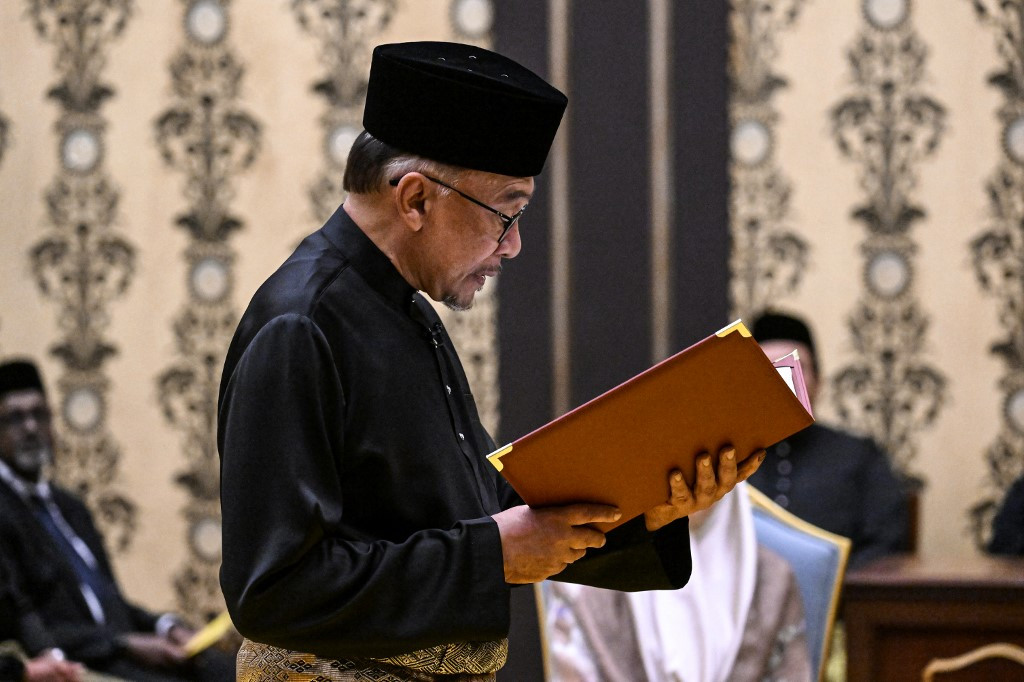Popular Reads
Top Results
Can't find what you're looking for?
View all search resultsPopular Reads
Top Results
Can't find what you're looking for?
View all search resultsDoes Malaysia’s unity government lack Malay support?
Regardless of the skewed figures that seem to indicate that Anwar's new government is hobbled before it even starts forming a Cabinet, it was clearly stated that Malaysian voters across all races and creeds want the incoming government to tackle the rising cost of living and corruption.
Change text size
Gift Premium Articles
to Anyone
R
eports that the Pakatan Harapan (PH) party only received 11 percent of the Malay popular vote seems depressing. It portends the beginning of another round of debates that the unity government of Prime Minister Dato Seri Anwar Ibrahim is already hobbled even before it can begin to form a fully functional Cabinet.
Further suggestions that 94 percent of ethnic Chinese in Malaysia, coupled with another 83 percent of ethnic Indians, had voted for PH seems to point to a people that wants the country to reform with systemic vigor and resilience, yet lacks Malay support.
The latter is a premise that is deeply flawed, though, especially when foreign academic reports affirmed that any Malay support for the Barisan Nasional (BN) cannot be assumed to mean they can be considered part of PH’s votes.
With or without any intended mischief, Welsh appears to want to warn Pakatan Harapan that it is not as strong as it seems, even though the unity government has amassed the support of 148 members of parliament (MPs) as of Nov. 26, giving Prime Minister Anwar a two-thirds majority that can deliver on all kinds of reforms, including constitutional reform, which requires the support of 144 MPs from a total 222 members in the legislature.
Welsh overstates the risks and dangers of racial polarization for now, though. The reasons are simple. Prior to the Nov. 19 general election, it has been stated without any ambiguity – that is, based on poll after poll – that voters across all races, creeds and colors want the incoming government to tackle the rising cost of living and corruption.
Popular support for these two measures often reached 84 percent and 82 percent, respectively. In other words, voters were undoubtedly concerned with the state of the Malaysian economy, invariably as a runaway double whammy.
When things were not gaining the right trajectory and ballast, it is predictable that they would want change. Granted, Pakatan Harapan, or the Alliance of Hope, does want change and has been echoing this since 1998 if not earlier through the long struggle of Anwar and other colleagues who are now in PH with him.
The 11 percent of Malay support in 2022 suggests that the party’s focus on creating a "Malaysia for all Malaysians" seems to be exceedingly low and off-key. Only, Welsh’s figure is not properly contextualized.
To build a nation that is "strong, formidable and inclusive", to paraphrase Anwar as he echoed the royal sentiment of the Malaysian monarch on Nov. 22, it is he who is amenable to a unity government.
In fact, had Perikatan Nasional (PN) under Sri Mahyuddin Yassin and Awang Hadi not participated in any "Sheraton Move" in February 2020 to betray voters’ confidence, 54 percent of the Malay votes would be in PH’s column to make its votes 65 percent.
Thus, Welsh’s study has totally missed the treachery racial candies and bait that shredded the Malay unity that had been, in fact, for all of Malaysians since May 9, 2018. That was before Mahathir Mohammad took this diabolical move to make Malaysia into a “Malay first” nation.
If the latter was indeed what the Malays themselves wanted, which was not the case, surely Mahathir's Gerakan Tanah Air (GTA) coalition could have at least won one seat or more. Instead, hundreds of GTA candidates lost all their electoral deposit. That is the folly of Welsh’s study.
In no manner or form was she careful about understanding that the period of the single race nomenclature was starting to see the beginning of the end. BN saw this on the night of their defeat during the 15th general election (GE15) though, which is why even UMNO and BN president Datuk Seri Zahid Hamidi was quick to comply with the wishes of the monarch and voters, even against the members of his own coalition who howled for his resignation.
He didn't resign, as he knew that the leaders of the two Bornean states of Sarawak and Sabah could be persuaded to reconstitute Malaysia anew, which they did by joining the unity government to allow Anwar to be the 10th prime minister of Malaysia in a regal, peaceful and swift transition of power.
Pakatan Harapan's unity government with BN and the two pan-Borneo parties now know how to work together to regain the Malay and Malaysian votes for the betterment of Malaysia to work closely with Indonesia, which will relocate its capital to Nusantara in Kalimantan, its territory on the natural resource-rich island of Borneo that the two nations share.
***
The writer is CEO and cofounder of Strategic Pan Indo Pacific Arena.










